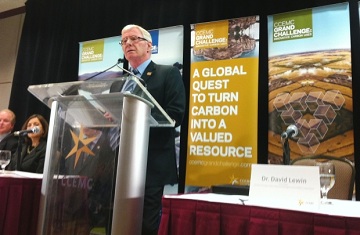Your green idea could capture $10 million from Alberta's climate change fund

Your bright idea to turn waste carbon into a marketable product could win a $10 million grand prize from Alberta’s climate change fund.
The announcement Thursday of a worldwide competition with $35 million worth of cash prizes had a whiff of reality show television to it, but the stakes of a cleaner environment and more sustainable development are considerably higher.
“The goal of the grand challenge is to significantly reduce greenhouse gas emissions by fostering the development of technologies that create new carbon-based value-added products and markets,” said Paul Clark, grand challenge committee chair for the Climate Change and Emissions Management Corp. (CCEMC).
The organization hopes to find a useful and profitable application for industrial carbon emissions — so far, an elusive and daunting task.
“Ultimate success in this grand challenge will result in technologies that can provide a net reduction in greenhouse gas emissions of one megatonne annually,” the CCEMC said in a release.
The non-profit group, which was started by the provincial government but operates at arm’s length, collects funds from carbon-emitters like power plants and oilsands mines and invests them into clean technology projects. Those funds will be tapped to pay out the prize money.
So far, CCEMC says it has committed to fund 49 projects with a combined value of nearly $1 billion. Together, those projects could reduce greenhouse gas emissions by about eight megatonnes over 10 years, or enough to take more than 1.6 million cars off the road.
“It’s a good start, but we need to do more,” said David Lewin, CCEMC vice-chair. “We need to accelerate the reduction of (greenhouse gases). That’s why we are launching an international competition to find innovative uses for carbon that at the same time will enable us to reduce greenhouse gases.”
Lewin said it’s a formidable goal for one province so the group wanted to tap into ideas and technology on a global scale.
“Truly, the grand challenge we face isn’t Alberta’s alone. It’s a challenge for all the nations on the planet.”
Alberta Environment Minister Diana McQueen agreed, saying no single jurisdiction can tackle climate change alone.
She called the challenge, a “bold, international initiative.”
There are three rounds of funding, totalling $35 million over five years. Submissions from applicants are being accepted at the corporation’s website www.ccemcgrandchallenge.com. Submissions are due for the first round by July 15 to be eligible for grants of $500,000 for up to 20 projects. Proposals will be judged by a panel of science, business and academic representatives. First-round winners will be announced in March 2014.
The second round will provide $3 million each for up to five projects that have successfully advanced their technologies. Those applicants will continue to the final round, where a winner will be chosen and awarded a $10-million grant to establish and commercialize their technology. The contestants maintain their intellectual property, but the CCEMC will connect winners with mentors, business developers, venture capitalists and potential partners.
What makes the technical challenge a tough one is the highly stable molecular makeup of carbon, said Eddy Isaacs, CEO of Alberta Innovates, Energy and Environment Solutions, which will help with the judging.
“Once carbon dioxide is emitted, it will stay in the atmosphere for an average of 100 years,” Isaacs said. “It does take a lot of energy to break down the CO2 and to convert it into a useful product that has economic value. That’s why the grand challenge is really a challenge.”
The usual approach to treating industrial carbon dioxide emissions is to capture it and store it underground or use it to enhance oil recovery.
“If we could efficiently convert the CO2 into something useful, we could create a revenue stream to offset the cost of capturing CO2.”
It could take as long as 20 or 30 years to bring a technology to market and what works in the lab may not work on a large scale, he said.
As examples, the CCEMC said it is looking for processes that produce high-value goods from greenhouse gas emissions, technologies that fix captured carbon into solid or easily transportable materials and biological solutions that capture carbon and convert it into a viable product, like creating oils from algae.
One Calgary-based startup is already itching to enter the grand challenge. Expander Energy Inc. has developed technologies to upgrade carbon waste streams from oilsands and refining facilities into synthetic diesel and jet fuel. Funding from the grand challenge could help the company find other applications for its technology such as at biomass and municipal solid waste facilities, said CEO James Ross.
“The challenge that all startup companies have is access to capital,” Ross said.
Winning the challenge would also open doors, he added.
“It’s very difficult to walk into large organizations such as oil companies and refineries and tell them that what they’ve been doing for a hundred years is wrong.”
You can return to the main Market News page, or press the Back button on your browser.

